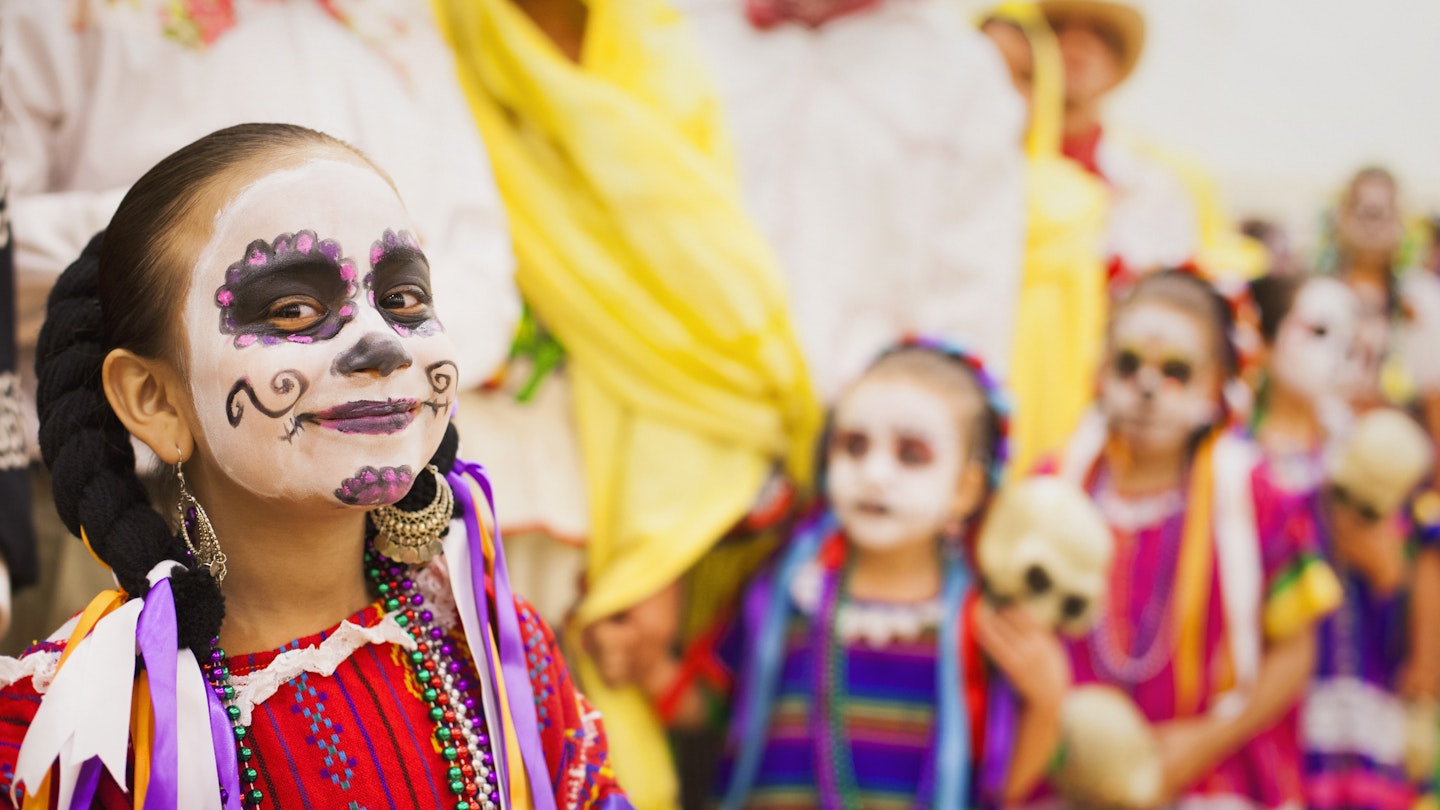Día de Muertos Celebrations Across the U.S.
At the start of every November, millions of people across Mexico and beyond celebrate the lives of their dearly departed—with ofrendas (altars), calaveras (skulls), poetry, and some of the most colorful face paint in the world. The holiday is known as Día de Muertos (Day of the Dead) and has its origins in Aztec and other pre-Hispanic cultures.
These ancient peoples honored their dead in lengthy, summertime celebrations. Over time, these traditions evolved and became entwined with the Catholic beliefs of colonizers in the New World, shifting the timing of these celebrations to November 1st and 2nd (All Saints and All Souls Days, respectively).
Thousands of years later, Mexicans and people with Latin heritage continue to host a reunion of sorts with those they’ve lost on these two days. November 1 is dedicated to the souls of children gone too soon, while November 2 honors the rest of the dearly departed. Families create ofrendas with photos of the deceased, flowers, foods, and more, allowing the souls of those gone to return for a night. Many also visit cemeteries to clean up and leave offerings for lost friends and relatives.
In certain cities across the U.S., this tradition holds strong, with large celebrations including parades and block parties bringing Mexican-Americans closer together. Here are some of the biggest, most authentic celebrations across the country.
1. Los Angeles
Home to one of the largest Mexican diasporas, Los Angeles is host to a number of Día festivities. Over the past 30 years, Olvera Street has become one of the most popular destinations, hosting events from October 25 through November 2. Community altars are displayed, and processions happen nightly, providing an opportunity for attendees to have their faces painted.
The major celebration, LA Day of the Dead, occurs at the Hollywood Forever Cemetery on October 31. Now in its 23rd year, events include cultural performances, rituals, a cathedral art exhibit, live music, and a children’s plaza. The theme this year is Mayahuel, the Aztec Goddess of Fertility.

2. Chicago
The National Museum of Mexican Art in Chicago is one of the top Latinx museums in the nation, hosting an impressive Día celebration known as Día de Los Muertos Xicágo. This annual event takes place both in the museum and in surrounding outdoor areas.
Visitors can engage with exhibitions like Día de Muertos – Memories & Offerings, which pays tribute to those lost to COVID and other tragedies over the last year. Outside, attendees create their own altars, enjoy live performances, and savor delicious pan de muerto, a bread typically enjoyed during the holiday.

3. San Antonio, Texas
Another city with a vibrant Mexican influence is San Antonio, where you’ll find the annual Muertos Fest, taking place downtown. This year’s grand celebration features altars, cultural workshops (including mask and flower-making), mariachis, dance performances, live poetry, and an impressive procession over two days. Additionally, attendees can enjoy numerous Mexican art and food vendors, creating an exquisite experience.

4. San Francisco
The Mission District is the place to be when celebrating Día in San Francisco. The annual Festival of Altars, hosted by the Marigold Project, takes place in Garfield Park featuring a massive procession. Attendees bring candles, flowers, and photos to leave at the communal altar, or they can create their own.
This year, the event will be held in-person and available as a live stream. Locals can also visit the Mission Cultural Center for Latino Arts to check out the 36th annual Day of the Dead event, titled Siempre Viviras En Mi Corazon – You Will Always Live In My Heart. Artists create installations dedicated to the holiday, on display throughout October.
5. Fort Lauderdale
South Florida is a melting pot of Latinx cultures, creating one of the most vibrant Día events yet. The Florida Day of the Dead in Fort Lauderdale is best known for its amazing skeleton processional, led by mariachis and massive skeleton puppets, some towering at nearly 20 feet. Additionally, attendees can enjoy indigenous music and dance performances, sugar-skull face painting, and a street festival featuring food trucks and street performers.

6. Albuquerque, New Mexico
The Muertos y Marigolds Parade in New Mexico’s South Valley is undoubtedly the largest Día celebration in town. Typically beginning with workshops like face painting and calavera doll making, the month also features delicious food from local vendors and arts and crafts. As a whole, Albuquerque celebrates the holiday with a full month of activities, also hosting a community ofrenda exhibit.
7. Austin, Texas
Austin boasts a grand Día de Muertos event called the Viva La Vida Festival, organized by the Mexic-Arte Museum. This festival draws thousands of attendees with a grand procession, an educational pavilion with hands-on activities for all ages, and folkloric ballet performances. Activities typically begin on October 29, lasting throughout the day.
8. San Diego
San Diego hosts numerous Día events in October and November, including Sherman Heights Día de Los Muertos, featuring face painting and flower crown workshops, along with a candlelight processional. However, Old Town’s Día de los Muertos celebration draws the most attention, held in the town’s mercado, where attendees can tour altars, participate in costume contests, and enjoy food, drinks, and dance.
9. New York City
Among the largest Día festivities in the nation is the New York City Day of the Dead Festival in Staten Island. Two impressive altars are created, one being communal where guests can bring photos and offerings for their deceased loved ones. Additionally, local nonprofit Mano a Mano hosts a large, multi-day event featuring live performances and a marketplace to purchase ofrenda essentials.
In summary, Día de Muertos is a significant holiday celebrated across various cities in the U.S., honoring the lives of those who have passed. By participating in these vibrant cultural traditions, attendees gain insight into the rich heritage of the Mexican community and the importance of remembrance.




